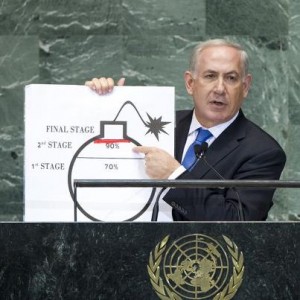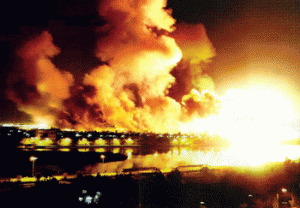Florida's Nuclear Plants
September 9, 2017
Gorilla Radio is dedicated to social justice, the environment, community, and providing a forum for people and issues not covered in State and Corporate media. The G-Radio can be found at: www.Gorilla-Radio.com, archived at GRadio.Substack.com, and now featuring on Telegram at: Https://t.me/gorillaradio2024. The show's blog is: GorillaRadioBlog.Blogspot.com, and you can check us out on Twitter @Paciffreepress
Special Report: U.N. investigative reports, like a new one condemning Syria for alleged sarin use, are received as impartial and credible, but are often just more war propaganda from compromised bureaucrats, reports Robert Parry.
After World War II, the Nuremberg Tribunals declared that a “war of aggression … is not only an international crime; it is the supreme international crime differing only from other war crimes in that it contains within itself the accumulated evil of the whole.”
 Israeli Prime Minister Benjamin Netanyahu at the United Nations in 2012, drawing his own “red line” on how far he will let Iran go in refining nuclear fuel.
Israeli Prime Minister Benjamin Netanyahu at the United Nations in 2012, drawing his own “red line” on how far he will let Iran go in refining nuclear fuel.  At the start of the U.S. invasion of Iraq in 2003, President George W. Bush ordered the U.S. military to conduct a devastating aerial assault on Baghdad, known as “shock and awe.”
At the start of the U.S. invasion of Iraq in 2003, President George W. Bush ordered the U.S. military to conduct a devastating aerial assault on Baghdad, known as “shock and awe.”  A heart-rending propaganda image designed to justify a major U.S. military operation inside Syria against the Syrian military.
A heart-rending propaganda image designed to justify a major U.S. military operation inside Syria against the Syrian military. Investigative reporter Robert Parry broke many of the Iran-Contra stories for The Associated Press and Newsweek in the 1980s. You can buy his latest book, America’s Stolen Narrative, either in print here or as an e-book (from Amazon and barnesandnoble.com).

“This aggression comes in a desperate attempt to raise the collapsed morale of the ISIS terrorists after the sweeping victories achieved by the Syrian Arab Army against terrorism on several fronts, and it affirms the direct support provided by the Israeli entity to the ISIS and other terrorist organizations,” the Army Command said in a statement.
Because Israel has staked first its survival and ultimately its growth into a dominant regional power on the disunity of its neighboring nations, it comes as no surprise that, faced with a winding-down of the Syrian conflict, it is now moving sharply against that development.
The best way to help Israel deal with Iran’s growing nuclear capability is to help the people of Syria overthrow the regime of Bashar Assad,”
Bringing down Assad would not only be a massive boon to Israel’s security, it would also ease Israel’s understandable fear of losing its nuclear monopoly.”
A successful intervention in Syria would require substantial diplomatic and military leadership from the United States” and states that “arming the Syrian rebels and using western air power to ground Syrian helicopters and airplanes is a low-cost high payoff approach.”
Republish our stories! MintPress News is licensed under a Creative Commons Attribution-NonCommercial-ShareAlike 3.0 International License.
 When Donald Trump says he “loves children” as he did in trying to make the case that his termination of the Deferred Action for Childhood Arrivals (DACA) program was not a case of child abuse, it’s important to remember that Trump has also amped up US support for Saudi Arabia’s brutal war on Yemen, and has specifically continued to supply the Saudi air force with US-made cluster bombs, the primary victims of which are children.
When Donald Trump says he “loves children” as he did in trying to make the case that his termination of the Deferred Action for Childhood Arrivals (DACA) program was not a case of child abuse, it’s important to remember that Trump has also amped up US support for Saudi Arabia’s brutal war on Yemen, and has specifically continued to supply the Saudi air force with US-made cluster bombs, the primary victims of which are children. “While Canadian troops are still required to stay away from the border with Russia and the fighting in eastern Ukraine,” Lubiniecki told a Toronto reporter, “the rest of the country is now fair game.”
“That’s what allies do for one another. They share lessons learned… That’s certainly what occurs between Ukrainians and Canadians.”
Update: Dimitri Lascaris answers...
“A recent escalation in the latest violence has raised the official death toll since the October crackdown to 134, although Rohingya advocacy groups put it at more than 420. Despite Bangladesh’s refusal to take refugees, several hundred are believed to have fled to camps there. A number who crossed the Naf River separating the two countries in the middle of November were gunned down mid-river. While a number of security personnel have been killed in skirmishes, the overwhelming majority of deaths have been Rohingya.”
“Soldiers came in to Doetan village in the evening of [November 19] about 5pm. Most of the men from the village ran away because they are afraid of being arrested and tortured. Then they [the soldiers] started shooting and two were killed.”
“It’s very brutal and the issue [in] that area is access to displaced people and even non-displaced. And it’s not only the poor, it’s everyone because they can’t access markets and they cannot harvest—this is going to lead to a humanitarian disaster.”
In 2015, I published a series of articles exposing Jeremy Corbyn’s links with anti-Semitic figures, and this led to what is now known as the “Labour anti-Semitism scandal.”
UPDATE: In just 8 hours we have received £21,790 in donations to the fighting fund. This is a fantastic start. 836 individuals have donated, making the average donation £26. The largest donation received is £1,000 and the smallest are £3. I am incredibly humbled and grateful that we are starting to have a chance. There have been so many kind messages, of which “you cast a lot of bread upon the waters helping others, Craig” made me greet for a bit. I have particularly enjoyed those from people who declare they agree with almost nothing I say but support free speech! About 60% of donations are from Scotland, but so far we have 22 different countries.
I really cannot express my gratitude enough.
On a practical point, a number of people have said they are not members of Paypal so could not donate. After clicking on “Donate”, just below and left of the “Log In” button is a small “continue” link which enables you to pay by card without logging in. For those who prefer not to pay online, you can send a cheque made out to me to Craig Murray, 89/14 Holyrood Road, Edinburgh, EH8 8BA. As regular readers know, it is a matter of pride to me that I never hide my address. A surprising number of people have asked for a Bitcoin option and we are working on it.
“Like any other country, sanctions against Israel should be considered when it consistently fails to meet international law and obligations, particularly in relation to the occupation which has denied rights to the Palestinian people for half a century. I support looking into targeted sanctions to put strategic pressure on the Israeli government.”
“Some of the criticism brewing in Canada against the state of Israel, including from some members of Parliament, is similar to the attitude of Nazi Germany in the Second World War, Prime Minister Stephen Harper warned.”
Yves Engler is the author of A Propaganda System: How Canada’s Government, Corporations, Media and Academia Sell War and Canada in Africa: 300 years of aid and exploitation.
Read other articles by Yves.
A once favorable balance of power has shifted, clipping Tel Aviv's wings
 Tel Aviv has had a bad few weeks. A once favorable regional balance of power has suddenly shifted in a direction that clips Israel’s wings—all while adversaries on its borders are making swift strategic gains. At the core of the issue is Israel’s obsession with Iranian ascendancy in the region. The 2015 nuclear deal that ended the Islamic Republic’s isolation was a real setback for the Israeli establishment, but what really hit home this summer was a steady succession of political and military victories for the Syrian government of Bashar al-Assad and his Iranian and Hezbollah allies.
Tel Aviv has had a bad few weeks. A once favorable regional balance of power has suddenly shifted in a direction that clips Israel’s wings—all while adversaries on its borders are making swift strategic gains. At the core of the issue is Israel’s obsession with Iranian ascendancy in the region. The 2015 nuclear deal that ended the Islamic Republic’s isolation was a real setback for the Israeli establishment, but what really hit home this summer was a steady succession of political and military victories for the Syrian government of Bashar al-Assad and his Iranian and Hezbollah allies. “The enemy [Israel],” announced Nasrallah after the fight, “is crying over its orphans and is acknowledging the defeat of its project and friends in Syria.”
“In Syria, if the choice is between Iran and the Islamic State, I choose the Islamic State.”
“Iran is the largest supporter of the Ezzedine al-Qassam brigades [Hamas’ military wing] in terms of financial support and support with weapons,” and expressed optimism that “the Syrian crisis shall end, which will open the horizons for restoring the relations with [Syria].”
Sharmine Narwani is a commentator and analyst of Mideast geopolitics, based in Beirut.